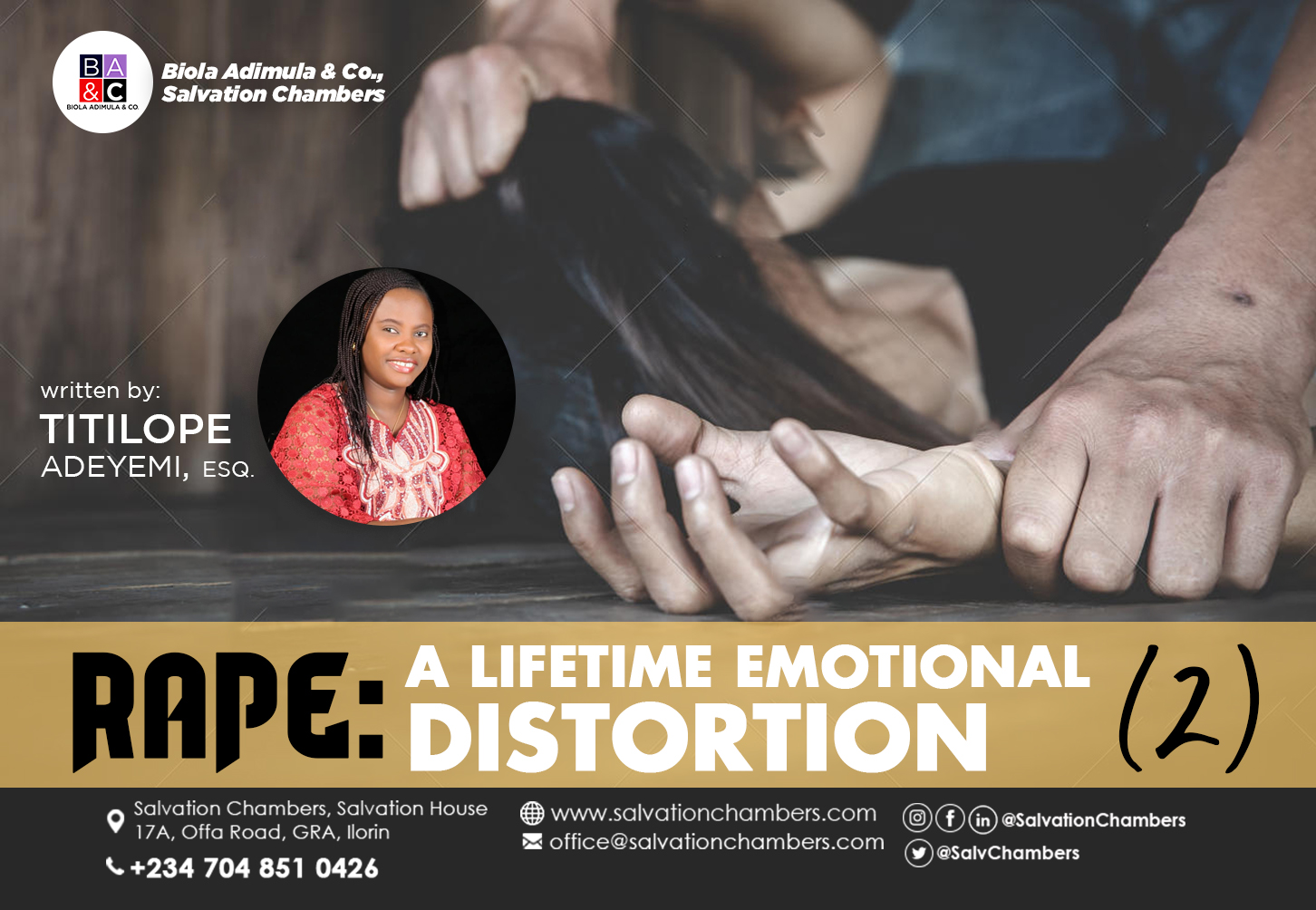Continuation
How to Help Victim of Rape Get Justice
1. If the assault has just occurred, ensure the victim does not bathe, douche, eat, drink or wash any parts of their body until the medical examination is done.
2. Encourage the victim to visit the closest primary health care center, so that the victim can be examined to preserve the relevant evidence as soon as possible.
3. Make a report at the Family Support Unit of the closest police station to ensure the case is investigated and the perpetrator is brought to book.
4. Preserve any physical evidence of the assault including all clothing and records of communication with the perpetrator, if any, and ensure these are well preserved and documented.
5. Keep the collected items in a separate bag for the purpose of conducting a DNA Lab forensic examination on them. This may assist the prosecutor in linking the crime to the perpetrator.
6. The victim should document as much detail about the assault as possible, including descriptions of the assailant, both in writing and by verbal recording.
7. When your child or ward discloses a rape or sexual incident to you, do not overreact as this may cause the victim especially minors to withdraw.
8. When you are told about a rape or assault incidence, listen without being judgmental, empathize, and show support with encouraging words and positive body language.
9. Do not join them to threaten the victim or emotional blackmail the victim from making a formal report or settle the case out of Court. Offence of sexual assault and rape is an offence against the state.
10. Reporting the matter will ensure the victim gets justice and prevent the perpetrator, do not continue to carry out this devilish act.
PUNISHMENT FOR RAPE
Under the Criminal Code, the Violence Against Persons (Prohibition) Act 2015 (VAPPA) and Child Right Act, the punishment for rape is life imprisonment but the under the Penal Code it is a maximum of 14years imprisonment. Attempted rape under the Criminal Code is 14years imprisonment. Gross Indecency under the Penal Code is punishable with 7years imprisonment.
Juvenile Offenders: Under the Criminal Code, a male under 12 is incapable of rape. He can only be charged for indecent assault. However, VAPPA states that offenders less than 14years can be sentenced to a maximum of 14years imprisonment.
Gang Rape: VAPPA provides specific punishment for gang-rapist. It is a minimum of 20years without an option of fine.
RECOVERING FROM RAPE OR SEXUAL TRAUMA
Step 1: Open up about what happened to you
It can be extraordinarily difficult to admit that you were raped or sexually assaulted. There’s a stigma attached. It can make you feel dirty and weak. Reach out to someone you trust. It’s common to think that if you don’t talk about your rape, it didn’t really happen. But you can’t heal when you’re avoiding the truth. And hiding only adds to feelings of shame.
Step 2: Cope with feelings of guilt and shame
Even if you intellectually understand that you’re not to blame for the rape or sexual attack, you may still struggle with a sense of guilt or shame. Feelings of guilt and shame often stem from misconceptions such as:
• You didn’t stop the assault from happening.
• You trusted someone you “shouldn’t” have.
• You were drunk or not cautious enough.
Step 3: Prepare for flashbacks and upsetting memories
When you go through something stressful, your body temporarily goes into “fight-or-flight” mode. When the threat has passed, your body calms down. But traumatic experiences such as rape can cause your nervous system to become stuck in a state of high alert. You’re hyper sensitive to the smallest of stimuli.
To reduce the stress of flashbacks and upsetting memories:
Try to anticipate and prepare for triggers.
Pay attention to your body’s danger signals.
Take immediate steps to self-soothe.
Accept and reassure yourself that this is a flashback, not reality.
Ground yourself in the present.
Step 4: Reconnect to your body and feelings
Since your nervous system is in a hypersensitive state following a rape or assault, you may start trying to numb yourself or avoid any associations with the trauma. But you can’t selectively numb your feelings. When you shut down the unpleasant sensations, you also shut down your self-awareness and capacity for joy. You end up disconnected both emotionally and physically—existing, but not fully living.
Step 5: Stay connected
It’s common to feel isolated and disconnected from others following a sexual assault. You may feel tempted to withdraw from social activities and your loved ones. But it’s important to stay connected to life and the people who care about you. Support from other people is vital to your recovery.
Step 6: Nurture yourself
Healing from sexual trauma is a gradual, ongoing process. It doesn’t happen overnight, nor do the memories of the trauma ever disappear completely.
You should take time to rest and restore your balance, avoid immersing yourself in television or programs that may trigger flashback, eat right and exercise regularly. Exercise is especially soothing on your nervous system it relieves stress and makes you feel more in control of your body and therefore “powerful”.⁷
Healing from the trauma of rape or sexual assault takes time. Flashbacks, nightmares, debilitating fear, and other symptom of Post-traumatic stress disorder (PTSD) can persist long after any physical injuries have healed.
It is important to note that there are several agencies, lawyers, NGOs interested in helping out victims of rape.
I will draw my conclusion from the Peace Women assertion, “I would like to emphasize that sexual violence poses an obstacle to peace and security. It impedes women from participating in peace and democratic processes and in post-conflict reconstruction and reconciliation. As a tool of war it can become a way of life: once entrenched in the fabric of society, it lingers long after the guns have fallen silent. Many women lose their health, livelihoods, husbands, families and support networks as a result of rape. This, in turn, can shatter the structures that anchor community values, and with that disrupt their transmission to future generations. Children accustomed to acts of rape can grow into adults who accept such acts as the norm. This vicious cycle must stop, as we cannot accept a selective zero-tolerance policy”.⁹
Titilope Adeyemi Esq.
References
7. http://www.apho.org.uk/sexual-abuse/recovering-from-rape-and-sexual-trauma-guide/
8. https://www.peacewomen.org/content/conclusion-i-would-emphasize-sexual-violence-poses-obstacle

